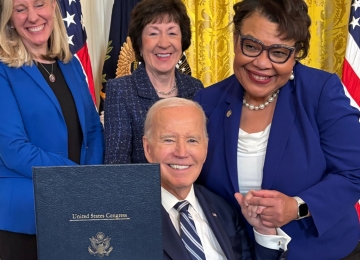On January 5, 2025, educators and public employees across Missouri and the nation celebrated a monumental victory as President Joe Biden signed the bipartisan Social Security Fairness Act (SSFA) into law. This landmark legislation repeals the Windfall Elimination Provision (WEP) and the Government Pension Offset (GPO)—unjust regulations that had slashed Social Security benefits for millions of public servants. For Missouri’s educators and members of the Missouri National Education Association (MNEA), this triumph is the result of decades of relentless advocacy and determination.
A Decades-Long Fight for Fairness
The passage of the SSFA marks the culmination of more than 40 years of advocacy led by the National Education Association (NEA) and its state affiliates, including MNEA. These discriminatory laws penalized public employees who earned pensions from their service while also contributing to Social Security, often reducing benefits by hundreds of dollars per month. The repeal of WEP and GPO is expected to restore an average of $360 per month to impacted individuals, providing long-overdue relief and financial security.
Phil Murray, president of MNEA, hailed the signing as a transformative moment for public educators. “This legislation is more than a financial adjustment—it is a recognition of the contributions educators make to their communities,” Murray stated. “Missouri’s teachers and support professionals have fought tirelessly for this, and today, their voices have been heard.”
Advocacy in Action
Missouri NEA members played a crucial role in securing this victory, mobilizing their communities and lobbying lawmakers at every level of government. Over the past year, members sent thousands of emails, made countless phone calls, and participated in rallies to demand fairness. Personal stories were at the heart of this advocacy, with educators sharing how WEP and GPO had slashed their hard-earned benefits, forcing them to make difficult financial decisions during retirement.

For retired Missouri educator Martha Karlovetz, the effects of these provisions were devastating. After a distinguished career as an elementary reading specialist and years as president of MNEA, she found that the WEP had cost her over $111,000 in Social Security benefits since her retirement in 1995. Even more disheartening, GPO meant she would receive only $14 per month in survivor benefits if her husband, who paid Social Security taxes for 40 years, passed away before her. Karlovetz joined the NEA-Retired Day of Action in Washington, D.C., last year, where she lobbied Missouri Congressman Jason Smith. “I told them, ‘I’ve been working on this since 2001. And I don’t have another 10 years to wait!’” she said.
A National and Local Impact
The SSFA affects more than 2.7 million Americans, including thousands of Missouri educators. By repealing WEP and GPO, the law ensures public employees receive the full Social Security benefits they earned, whether through direct contributions or as spouses and survivors. For many retirees like Karlovetz, this change restores dignity and financial security in retirement.
Educators like Karlovetz are not alone in their struggles. The stories of individuals penalized by WEP and GPO highlight the importance of this legislation. These provisions have particularly burdened women, whose career breaks for caregiving and lower lifetime earnings made them more vulnerable to these penalties. The repeal of these unjust laws not only restores benefits but also serves as a step toward equity for retirees.
Looking Ahead
A detailed rollout plan is expected soon, with provisions for retroactive payments to those affected in 2024. For members with questions about how the repeal of WEP and GPO will affect their benefits, MNEA has prepared a comprehensive FAQ. This resource addresses key details about the law’s implementation and its impact on Social Security payments.
As the legislation takes effect, its impact will ripple through communities, bringing financial stability and dignity to those who dedicated their lives to public service. The passage of the Social Security Fairness Act is not just a policy change—it’s a validation of educators' worth and contributions. This historic victory showcases the power of collective advocacy and sets the stage for further progress in supporting educators across Missouri and beyond.



